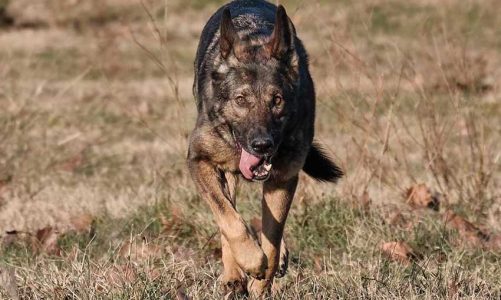Introduction
Watching your once playful dog struggle to get up, limp after a walk, or hesitate before jumping onto the couch is a heart-wrenching experience for any pet owner. Canine arthritis, a progressive and painful inflammation of the joints, affects millions of dogs worldwide, robbing them of their vitality. While modern veterinary medicine offers effective solutions, many owners are seeking natural, complementary approaches to support their furry friends. Enter Boswellia serrata, an ancient herbal extract with a modern scientific backing. This resin, known as Indian Frankincense, has been used for centuries in Ayurvedic medicine to combat inflammation. Today, it’s emerging as a powerful, natural ally in the fight against canine joint pain. This article delves into the science behind Boswellia, explores the research supporting its use, and provides a practical guide on how to incorporate it safely into your dog’s wellness routine, always under the guidance of your veterinarian.
What is Boswellia Serrata? More Than Just Frankincense
When you hear “frankincense,” you might think of the aromatic resin burned as incense in religious ceremonies. However, the Boswellia family has several species, and the one with potent medicinal properties for joint health is Boswellia serrata. Native to the dry, mountainous regions of India, this tree produces a resin that has been a cornerstone of traditional Ayurvedic medicine for thousands of years. Referred to as “Salai guggul,” it was historically used to treat a variety of inflammatory conditions, including arthritis, respiratory diseases, and digestive disorders. Unlike its cousin Boswellia sacra (which is often used for its scent), Boswellia serrata is prized for its high concentration of active therapeutic compounds, making it the primary species used in modern dietary supplements for both humans and animals.
Understanding Canine Arthritis: The Root of the Problem
To appreciate how Boswellia works, it’s essential to understand the enemy: osteoarthritis (OA). OA is not simply “stiffness” from old age; it’s a complex, painful, and degenerative disease where the protective cartilage that cushions the ends of bones wears down over time. This leads to a cascade of problems:
- Bone-on-bone contact, causing pain.
- Chronic inflammation: The body’s immune system releases a flood of inflammatory enzymes and chemicals (like prostaglandins and leukotrienes) into the joint in a misguided attempt to repair the damage.
- Further damage: This inflammatory soup actually accelerates the breakdown of cartilage and can cause painful bone spurs to develop.
This creates a vicious cycle of pain, inflammation, and decreased mobility. Common signs your dog may be suffering from arthritis include:
- Limping or favoring a leg
- Stiffness, especially after rest (“slow to get up”)
- Reluctance to run, jump, or climb stairs
- Lagging behind on walks
- Whining, licking, or chewing at a specific joint
- Behavioral changes like irritability or withdrawal
How Does Boswellia Work? The Science Behind the Relief
The power of Boswellia lies in its unique compounds called Boswellic Acids. The most potent of these is Acetyl-11-keto-β-boswellic acid (AKBA). These acids work through a different inflammatory pathway than conventional non-steroidal anti-inflammatory drugs (NSAIDs) like carprofen.
Most NSAIDs work by inhibiting cyclooxygenase (COX) enzymes, which are responsible for producing prostaglandins that cause pain and inflammation. Boswellia’s primary mechanism is the inhibition of a different enzyme: 5-lipoxygenase (5-LOX).
By blocking 5-LOX, Boswellia serrata effectively:
- Reduces Leukotrienes: It prevents the production of leukotrienes, which are powerful inflammatory molecules that attract immune cells to the joint, perpetuate chronic inflammation, and contribute to pain and swelling.
- Protects Cartilage: Some research indicates that Boswellic acids may inhibit destructive enzymes (matrix metalloproteinases) that break down cartilage tissue, offering a protective effect.
This dual action—curtailing inflammation and potentially protecting joint structures—makes Boswellia a comprehensive and natural option for managing the multifaceted nature of arthritis.
The Evidence: What Does the Research Say About Boswellia for Dogs?
The traditional use of Boswellia is compelling, but modern science provides the critical evidence needed for veterinary recommendation. Several studies have demonstrated its efficacy:
A pivotal 2004 study published in the American Journal of Veterinary Research by Reichling et al. investigated the effects of a patented Boswellia extract on dogs with arthritis. The results showed a significant reduction in lameness and improved mobility after just six weeks of treatment, with researchers concluding it exhibited clear anti-inflammatory and anti-arthritic effects.
A more recent 2017 study (also led by Reichling) compared the same Boswellia extract against a placebo in a randomized, controlled, double-blind trial—the gold standard of scientific research. Dogs receiving the Boswellia extract showed statistically significant improvements in pain scores and functional ability compared to the placebo group. These studies, among others, form a solid foundation for the use of Boswellia serrata in veterinary practice. Systematic reviews of herbal medicines for osteoarthritis often highlight Boswellia as one of the most promising candidates due to its mechanism of action and growing body of positive clinical evidence.
Potential Benefits Beyond Joint Health
While joint health is its primary application, the broad anti-inflammatory properties of Boswellia serrata may offer other benefits for dogs, though more canine-specific research is needed in these areas:
- Gastrointestinal Health: Its anti-inflammatory action can be beneficial for conditions like Inflammatory Bowel Disease (IBD) or colitis, helping to soothe an irritated gut lining.
- Skin Allergy Support: Allergies are driven by an inflammatory response. By modulating systemic inflammation, Boswellia may help reduce the itching and discomfort associated with environmental or food allergies.
- Respiratory Support: Reflecting its traditional use, Boswellia may help support respiratory health by reducing inflammation in the airways, potentially benefiting dogs with mild asthma or bronchitis.
It is crucial to note that using Boswellia for these conditions should only be done under direct veterinary guidance, as the diagnosis and treatment plan are far more complex.
Important Considerations: Safety and Potential Side Effects
Boswellia serrata is generally considered very safe for dogs when used appropriately. However, responsible use means understanding potential side effects and interactions.
- Common Side Effects: The most frequently reported issue is mild gastrointestinal upset, such as nausea, diarrhea, or gas. This is often avoided by administering the supplement with a meal.
- Drug Interactions:
- NSAIDs (e.g., Carprofen, Meloxicam): While often used together under a vet’s careful supervision, there is a theoretical risk of increased bleeding or GI ulceration when combining anti-inflammatory agents. This combination requires professional oversight.
- Anticoagulants (Blood Thinners like Warfarin or Clopidogrel): Boswellia may have mild blood-thinning properties. Combining it with prescription anticoagulants could potentiate this effect and is generally not recommended.
- Contraindications: It is advised to avoid using Boswellia in pregnant or nursing dogs due to a lack of safety data.
- Quality is Key: The biggest risk often comes from low-quality supplements that may be contaminated with heavy metals or not contain the advertised amount of active ingredient. This underscores the importance of choosing a reputable brand.
How to Choose a High-Quality Boswellia Supplement for Your Dog
The supplement market is unregulated, making it vital to be an informed consumer. Here’s what to look for:
- Standardized Extract: This is the most important factor. The label should explicitly state that it is standardized to a specific percentage of Boswellic Acids (e.g., 70% or higher). Standardization guarantees potency and consistency from batch to batch.
- High AKBA Content: The best products will also specify the percentage of AKBA, the most active boswellic acid. Look for an extract with enhanced AKBA levels for superior efficacy.
- Enhanced Bioavailability: Boswellic acids are fat-soluble. Premium supplements will often be formulated with a lipid base or use other technologies to significantly improve absorption in the gut.
- Third-Party Testing: Choose brands that invest in independent testing to verify purity, potency, and the absence of contaminants like heavy metals, pesticides, and microbes.
- Veterinary Formulation: Always choose a product designed for dogs. These will have appropriate dosing instructions and avoid any harmful additives.
A product that exemplifies these qualities is Camelus FlexCare. It utilizes a high-quality Boswellia serrata extract alongside other synergistic joint-supporting ingredients like Glucosamine, Chondroitin, and Hyaluronic Acid, formulated specifically for canine bioavailability and safety. https://camelus.co.za/products/flexcare
Dosage and Administration: Working With Your Vet
There is no universal dosage for Boswellia, as it depends on the concentration of the extract, your dog’s weight, and the severity of their condition.
- General Guideline: A common dosing range found in veterinary supplements is 15-20 mg of total boswellic acids per pound (30-40 mg/kg) of body weight per day, often divided into two daily doses.
- Example: A 50lb dog might receive between 750mg and 1000mg of a Boswellia extract standardized to 70% boswellic acids per day.
- The Critical Rule: This is a guideline for your discussion with your veterinarian. Always consult your vet before starting any new supplement. They can provide a dosage tailored to your dog’s specific needs and health status.
- Administration: Give Boswellia with a meal to enhance absorption and minimize any risk of stomach upset.
- Patience is Key: Boswellia is not an instant painkiller. It is a natural modulator of inflammation. It typically takes 2 to 6 weeks of consistent use to see noticeable improvements in your dog’s comfort and mobility.
Integrating Boswellia into a Holistic Joint Care Plan
Boswellia is most effective as part of a multi-modal approach to joint health. Think of it as a powerful piece of a larger puzzle:
- Weight Management: This is the single most important thing you can do for an arthritic dog. Every extra pound puts exponential stress on their joints. Work with your vet on a weight loss plan if needed.
- Synergistic Supplements: Boswellia pairs excellently with other proven joint supplements:
- Glucosamine & Chondroitin: Provide the building blocks for cartilage repair and synovial fluid health.
- Omega-3 Fatty Acids (EPA/DHA from Fish Oil): Provide potent anti-inflammatory benefits through a different pathway.
- Green-Lipped Mussel: A fantastic source of Omega-3s, chondroitin, and other nutrients.
- For a broad range of options, explore high-quality joint supplements for dogs: https://camelus.co.za/collections/joint-supplements-for-dogs and general dog supplements: https://camelus.co.za/collections/dog-supplements
- Appropriate Exercise: Regular, low-impact exercise like leash walks and swimming helps maintain muscle mass (which supports joints) and prevents stiffness.
- Environmental Modifications: Orthopedic dog beds, ramps instead of stairs, and non-slip flooring can make your dog’s life much easier.
Frequently Asked Questions (FAQs)
Q: How long does it take for Boswellia to work in dogs?
A: You should allow 2 to 6 weeks of consistent daily use to see significant improvements. It takes time to build up in the system and modulate the inflammatory pathways.
Q: Can I give my dog human Boswellia supplements?
A: It is not recommended. Human supplements may contain different dosages, additives, or ingredients that are not safe for dogs. Always use a product specifically formulated for pets.
Q: Can Boswellia be used with prescription NSAIDs?
A: It can be, but this MUST be done under direct veterinary supervision. Your vet will need to monitor your dog for any potential side effects, as both substances have anti-inflammatory properties.
Q: Are there any dogs who shouldn’t take Boswellia?
A: Avoid using it in pregnant or nursing dogs. Use it with extreme caution and only under veterinary advice in dogs with known bleeding disorders or those already taking medication that affects blood clotting.
Conclusion
Boswellia serrata represents a beautiful confluence of ancient wisdom and modern science. It offers a powerful, natural, and well-researched option for managing the pain and inflammation associated with canine arthritis. Its unique mechanism of action, targeting the 5-LOX pathway, provides relief differently from conventional drugs, often with an excellent safety profile. By choosing a high-quality, standardized extract like those found in reputable veterinary supplements and, most importantly, partnering with your veterinarian to create a tailored holistic plan, you can harness the power of this ancient resin. In doing so, you offer your beloved dog a safe and effective way to regain comfort, improve mobility, and enjoy a significantly better quality of life in their golden years.



